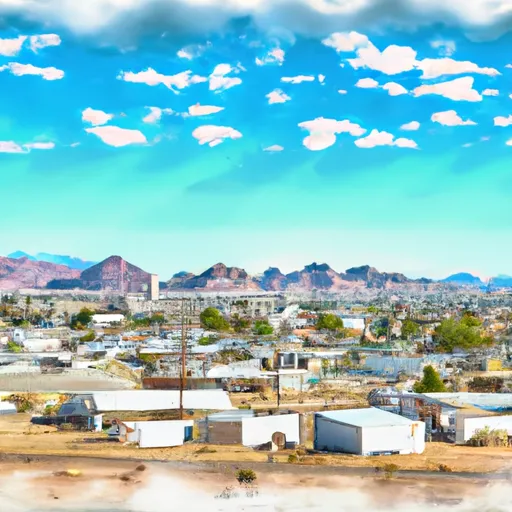-
 Snoflo Premium
Snoflo Premium
Get unlimited access to all our content
With no Ad interruptions! - Start Your Free Trial Login with existing account
Happy-Jack
Eden Index
Climate
8.9
•
Recreation
3.0
•
Community
•
Safeguard
4.6/10

Happy Jack, Arizona is a small mountain community located in the Coconino National Forest. The climate is cool and refreshing with summer temperatures rarely exceeding 80 degrees Fahrenheit and winter temperatures often dropping below freezing. The area is rich in hydrology constituents, with the nearby Lake Mary and Mormon Lake providing opportunities for fishing, boating, and water activities. The Happy Jack area is also known for its extensive trail system, offering hiking, mountain biking, and horseback riding opportunities. There are several campgrounds in the area, as well as cabins and lodges for those who want to stay longer. Overall, Happy Jack offers a tranquil and scenic setting for outdoor enthusiasts looking to escape the desert heat.
What is the Eden Index?
The Snoflo Eden Index serves as a comprehensive rating system for regions, evaluating their desirability through a holistic assessment of climate health, outdoor recreation opportunities, and natural disaster risk, acknowledging the profound impact of these factors on livability and well-being.
Climate Health Indicator (CHI): 8.9
Happy-Jack receives approximately
483mm of rain per year,
with humidity levels near 64%
and air temperatures averaging around
10°C.
Happy-Jack has a plant hardyness factor of
6, meaning
plants and agriculture in this region thrive during a short period during spring and early summer. Most
plants will die off during the colder winter months.
By considering the ideal temperature range, reliable water supplies, clean air, and stable seasonal rain or snowpacks, the Climate Health Indicator (CHI) underscores the significance of a healthy climate as the foundation for quality living.
A healthy climate is paramount for ensuring a high quality of life and livability in a region, fostering both physical well-being and environmental harmony. This can be characterized by ideal temperatures, reliable access to water supplies, clean air, and consistent seasonal rain or snowpacks.
Weather Forecast
Streamflow Conditions
Little Colorado
Area Rivers
Little Colorado
Snowpack Depths
Little Colorado
Reservoir Storage Capacity
Little Colorado
Groundwater Levels
Recreational Opportunity Index (ROI): 3.0
The Recreational Opportunity Index (ROI) recognizes the value of outdoor recreational options, such as parks, hiking trails, camping sites, and fishing spots, while acknowledging that climate plays a pivotal role in ensuring the comfort and consistency of these experiences.
Access to outdoor recreational opportunities, encompassing activities such as parks, hiking, camping, and fishing, is crucial for overall well-being, and the climate plays a pivotal role in enabling and enhancing these experiences, ensuring that individuals can engage in nature-based activities comfortably and consistently.
Camping Areas
| Campground | Campsites | Reservations | Toilets | Showers | Elevation |
|---|---|---|---|---|---|
| Tonto Creek | None | 5,400 ft | |||
| Houston Mesa | 30 | 5,039 ft | |||
| First Crossing | 7 | 4,865 ft | |||
| Flowing Springs | 40 | 4,580 ft | |||
| Upper Tonto Creek | 9 | 5,550 ft | |||
| Haigler Canyon | 14 | 5,314 ft | |||
| Sharp Creek | 28 | 6,007 ft | |||
| Ponderosa | 61 | 5,680 ft | |||
| Mogollon | 26 | 7,656 ft | |||
| Christopher Creek | 43 | 5,690 ft |
Catastrophe Safeguard Index (CSI):
The Catastrophe Safeguard Index (CSI) recognizes that natural disaster risk, encompassing floods, fires, hurricanes, and tornadoes, can drastically affect safety and the overall appeal of an area.
The level of natural disaster risk in a region significantly affects safety and the overall livability, with climate change amplifying these risks by potentially increasing the frequency and intensity of events like floods, fires, hurricanes, and tornadoes, thereby posing substantial challenges to community resilience and well-being.
Community Resilience Indicator (CRI):
The Community Resilience Indicator (CRI) recognizes that education, healthcare, and socioeconomics are crucial to the well-being of a region. The CRI acknowledges the profound impact of these elements on residents' overall quality of life. By evaluating educational resources, healthcare accessibility, and economic inclusivity, the index captures the essential aspects that contribute to a thriving community, fostering resident satisfaction, equity, and social cohesion.

